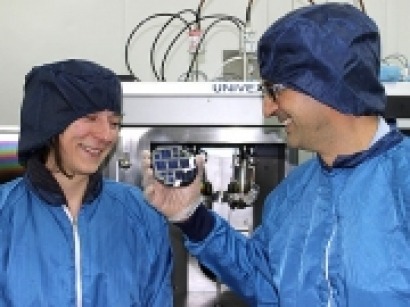
The cells developed by the UPC researchers have exceeded the average barrier of 15% efficiency reached by the most common photovoltaic cells. Specifically, they have achieved a conversion efficiency (from sunlight to electricity) of 20.5%, enabling energy output per unit area to be boosted by a third.
Thanks to the higher efficiency of this new cell, it would, for example, take only 4.8 square metres of solar panels to supply the energy consumed by a family in a year (around 4 kWh per day on average), whereas traditional cells would require 6.5 square metres.
Composed of crystalline silicon, the cell operates in a simple manner similar to that of conventional cells, which capture light to generate charges that are collected on the contact plate and transformed into electricity. "Our interest is to generate lots of charges that are not lost, i.e. that reach the contact plates," explains Ramon Alcubilla, a member of the research group. Finally, the sunlight converted into electrical current is injected into the mains for domestic and industrial uses.
The key to the project’s success has therefore been to minimise losses, which makes the silicon cells developed by the UPC researchers the most efficient in Spain. "We have made a considerable effort to design and develop new materials, new structures and new technology to make the whole process as perfect as possible and achieve high returns," added Alcubilla. Now the group are turning to the future and are developing procedures that enable the large-scale manufacturing of these new high-efficiency cells.
The outcome of this research, which has involved 38 trials since 2002, is up there with the research performed in other countries leading in the field of photovoltaics. In fact, the maximum efficiency of cells of this type is 24.7%, achieved by an Australian group from the University of New South Wales.
Photovoltaics around the world
According to the International Energy Agency, Spain boasts one of the highest levels of installed photovoltaic power, with more than 4,000 MW. The leader is Germany with 7,203 MW. Globally, the European Photovoltaic Industry Association reports that total installed capacity in 2009 was 22,787 MW, 15,943 MW of which was in the European Union. In fact, in two years, from 2007 to 2009, the EU has become an industry leader; tripling the number of PV installations, followed far behind by Japan with 2,633 MW.
In 2010, the Spanish network operator, Red Eléctrica Española, revealed that solar energy in Spain covered 2% of total electricity demand and represented 6.25% of the total covered by renewable sources, a category that includes hydropower, wind, solar thermal, biomass, geothermal and ocean energy, among others.
For additional information:

